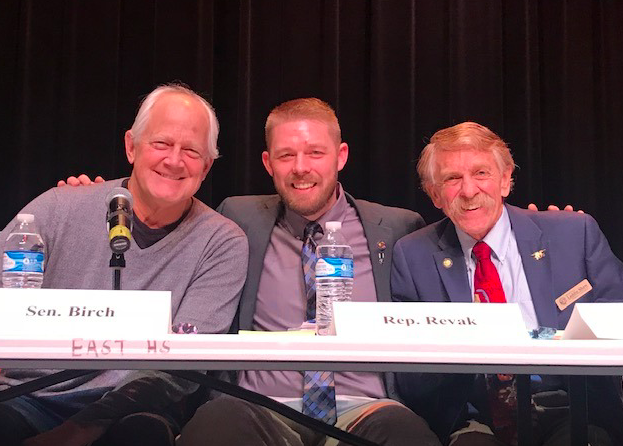The sudden loss of Sen. Chris Birch, who represented District M before his death last week, leaves Republicans with an awkward task: They are still grieving over the loss of their beloved friend and statesman, but must now find three people willing to serve as senator.
Republicans have a self-imposed deadline of receiving applications from interested persons in the district by Aug. 18.
This is a grassroots process that is handled by the Alaska Republican Party district chairs for House District 25 and 26, which make up the Senate Seat M district. Mike Robbins is chair of District 26, and Akis Gialopsis, who is chief of staff to Senate President Cathy Giessel, is chair of District 25. Robbins and Gialopsis will shepherd the process at the district level, with party officers standing ready to help.
The procedure comes from Article 1, Section 8 of the Alaska Republican Party rules. First, the two districts need to meet within 14 days of the vacancy and establish their method for vetting applications and voting. Districts can handle this how they see fit, within general rules.
The districts fulfilled the first task when they met on Monday night and determined their method.
The two districts will then, as one, forward three names to the governor, or four names, if they are unable to choose just three from the two House districts.
The last district to go through this process was for Senate Seat E, which Michael Dunleavy resigned from in 2018 in order to run for governor. Gov. Bill Walker named Mike Shower to that seat that serves Wasilla all the way to Valdez. It was a dramatic political event, however, because Walker did not abide by the two districts’ nominees, but went outside them and chose his own guy. The Senate Republicans rejected the offer of Walker’s choice, Randall Kowalke.
[Read: District E provides more names for Senate seat]
It is likely that Rep. Josh Revak (25) and Rep. Laddie Shaw (26), both freshmen in the House, will submit their letters of interest to their districts.
Shaw didn’t waver when asked by a reporter last week, but has since softened his stance. He says he is a team player and the freshmen in the House are his team that has been through a lot this year. He has felt a strong pull to stay with his team and represent his House district.
“I’m considering it. It is one of toughest decisions ever made in my life. I replaced Chris in the House. He was my senator, and also my constituent,” Shaw said. “And then there are my team mates. We stood by each other pretty strong, and have maintained our integrity, strength of character, and our team. This year, we’ve gone through a huge learning curve. Next time around, we’re going to be a little tougher,” Shaw said.
Revak was out of state vacationing with his wife and children and said that he is considering it as well, but was still processing Birch’s passing. Both he and Shaw said that they are deeply loyal to the group of freshmen that stood strong under pressure to bolt and join the majority that is led by Democrats, as some of their colleagues had.
The governor then makes the decision about who will serve as senator. The Republicans in the Senate must agree with his choice before he or she gets sworn in.
If these two do apply, and if one of them becomes a senator, then either District 25 or 26 will need to go through a similar process to fill the newly created vacancy in the House.
Because Birch served less than eight months, whomever is chosen would serve until the January following the next General Election, which is Nov. 3, 2020. They’ll have to run for the seat in that General Election if they want to keep it, but at least they’ll run as an incumbent who has served for one legislative session.
The ARP posted the rules and procedures at its Facebook page. The deadline for applications is Aug. 18 at 5 pm.
